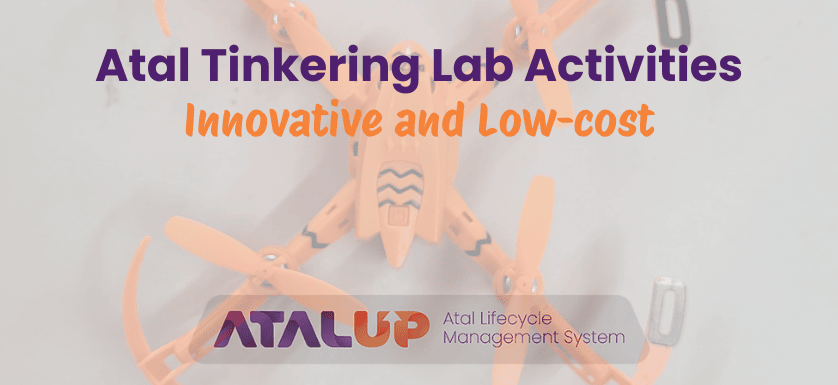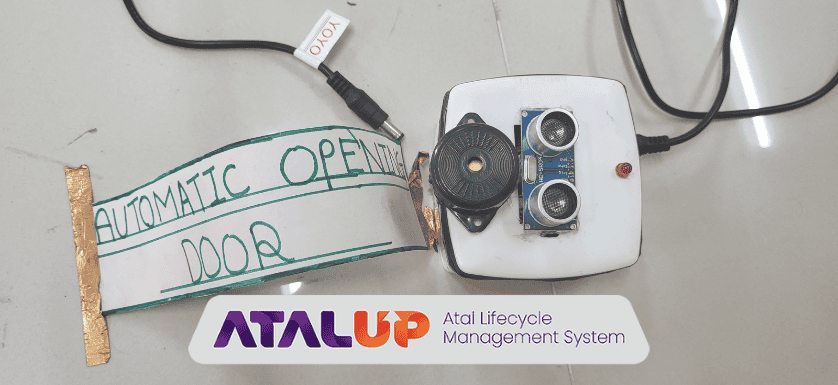
Atal Tinkering Labs (ATLs) are not defined by the equipment they house but by the ingenuity and resourcefulness of the students who utilize them. ATL Lab is not about what we have in the lab; it’s about what we do with what we have in the lab.
Performing unique Atal Tinkering Lab activities by emphasizing creativity over resources is the real key to success. ATLs empower students to develop innovative solutions using available materials, demonstrating that the essence of innovation lies in the application of knowledge rather than the sophistication of tools.
Real-Life Examples of Low-Cost Atal Tinkering Lab Activities
1. Affordable Braille Printer: A student from Maharashtra developed a cost-effective Braille printer using simple materials, significantly reducing the cost compared to traditional printers and enhancing accessibility for visually impaired individuals.
2. Solar-Powered Vehicles: Students have engineered solar-powered cars, teaching them about renewable energy and mechanical design while promoting sustainable transportation solutions.
3. Smart Irrigation Systems: By creating automated irrigation systems that monitor soil moisture and control water usage, students address agricultural challenges, promoting water conservation and improving crop yields.
Ideas for Low-Cost Atal Tinkering Lab Activities
ATL activities don’t need expensive kits. What students need is the right guidance, curiosity, and access to basic tools. Here are some Atal Tinkering Lab creative ideas that can be implemented using low-cost or easily available materials:
1. Water Level Indicator
- Use: Prevents water overflow in tanks.
- Materials: Small buzzer, wires, battery, water container, and probes.
- Learning Outcome: Basics of circuits, sensors, and automation.
2. Mini Wind Turbine
- Use: Demonstrates clean energy generation.
- Materials: Toy motors, plastic bottles, wires, LED, cardboard.
- Learning Outcome: Renewable energy concepts, mechanical design, problem-solving.
3. Smart Dustbins
- Use: Opens lid automatically when hand is near.
- Materials: Ultrasonic sensor, servo motor, Arduino UNO.
- Learning Outcome: Introduction to IoT and automation.
4. DIY Hand Sanitizer Dispenser
- Use: Promotes hygiene with touchless tech.
- Materials: Proximity sensor, small pump, Arduino.
- Learning Outcome: Application of sensor-based tech for health.
5. Obstacle Avoiding Robot
- Use: Demonstrates robotic movement control.
- Materials: IR sensor, wheels, Arduino, and chassis kit.
- Learning Outcome: Basics of robotics, real-time response systems.
6. Portable Solar Charger
- Use: Charges mobile phones or small devices.
- Materials: Small solar panel, voltage regulator, wires, and USB outlet.
- Learning Outcome: Solar energy usage, power electronics.
7. Rain Water Harvesting Model
- Use: Promotes sustainable water management.
- Materials: Pipes, funnels, plastic bottles, mesh.
- Learning Outcome: Water conservation, environmental engineering.
8. Food Waste to Compost Model
- Use: Teaches waste-to-resource conversion.
- Materials: Kitchen waste, soil, container with ventilation.
- Learning Outcome: Sustainability, natural decomposition, and ecosystem learning.
9. Bicycle-Powered Phone Charger
- Use: Promotes fitness and sustainable energy.
- Materials: Bicycle dynamo, rectifier circuit, and USB port.
- Learning Outcome: Kinetic to electric energy transformation.
10. Low-Cost Fire Alarm System
- Use: Warns early during fire emergencies.
- Materials: Thermistor, buzzer, battery, and basic circuit board.
- Learning Outcome: Fire safety, temperature sensors, emergency response systems.

Benefits of Excelling in Atal Tinkering Lab Activities
If your students are coming up with unique Atal Tinkering Lab creative ideas, it can lead to immense success for students as well as your school. Participation in ATL goes beyond projects; it opens doors for students and schools at many levels. Here’s how:
Benefits of Unique Atal Tinkering Lab Activities For Students
Enhanced Technical Skills
Gain hands-on exposure to electronics, programming, and real-world problem solving. Understand core STEM principles through practice, not just theory.
Boost in Confidence & Creativity
Presenting their ideas builds communication and public speaking skills. Thinking innovatively with limited resources sharpens creativity.
Career and Scholarship Opportunities
Recognition in national competitions leads to mentorships and innovation grants. Students gain an edge when applying to top engineering or design institutes.
Global Exposure
Participation in platforms like the ATL Marathon, AIM’s international forums, and exhibitions allows students to present ideas globally.
Early Entrepreneurship
Some students convert their ATL projects into real startups with guidance from incubators and mentors.
Benefits of Unique Atal Tinkering Lab Activities For Schools
National Recognition
Schools with active ATLs often feature in AIM reports, media stories, and educational conferences.
Improved Teaching Environment
Exposure to modern teaching tools and training for ATL in-charges enhances the overall academic atmosphere.
CSR Partnerships & Additional Grants
Schools that perform well in ATL often attract CSR funds, NGO support, and government recognitions.
Community Impact
Schools become innovation hubs for solving local challenges, gaining respect from parents, media, and local bodies.
Brand Positioning
Performing ATL schools stand out during admissions, becoming preferred choices for progressive parents.
Success Stories in ATL Competitions
Sensor-Based Accident Prevention Technology:
Supriya Sharma and Choden Tamang developed a sensor-based robotic system to prevent accidents on hilly roads, earning accolades and showcasing their innovation at national science festivals. Source
Atal Divyang Rath:
Mohnish Kumar Dhruv from Bilaspur created an innovative chair-cum-vehicle to assist specially-abled individuals in using washrooms without constraints, earning the National Inspire Award and presenting the product to the Prime Minister of India. Source
Conclusion
Atal Tinkering Labs exemplify that innovation is driven by creativity and application, not merely by the tools at hand. By engaging in low-cost, impactful projects, students can develop solutions that address real-world challenges, gain recognition, and contribute meaningfully to society. ATALUP is committed to supporting schools and students in this journey, providing resources and guidance to perform unique, cost-effective activities that foster innovation and excellence.